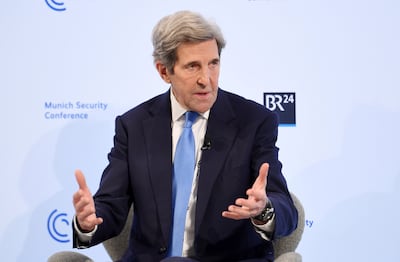Dr Sultan Al Jaber, Minister of Industry and Advanced Technology and UAE Special Envoy for Climate Change, addressed the Munich Security Conference on Friday, on the importance of investing in reducing carbon emissions.
“In my view, the only way to manoeuvre through the dynamics of the energy transition is to accept, to adopt a diversified energy mix approach. And that's exactly what we did in the UAE,” he said, pointing out the need for realistic assessments about the role oil and gas would play in the coming years.
“We continue to invest in decarbonising our oil and gas by applying CCS [carbon capture, utilisation and storage]," Dr Al Jaber said.
He said that in the Middle East the UAE was "the only nation that has captured 800,000 tonnes [of carbon dioxide]", and that this would increase to five million tonnes by 2030.
“We also installed nuclear power for baseload and we're investing heavily in renewable energy we are the home of the three largest solar power plants and the three largest lowest cost solar power production plants in the world.”
Asked what his top priority for the year ahead would be, Dr Al Jaber said he hoped the “phenomenal achievement” made by world leaders at the Cop26 UN Climate Conference in Glasgow, Scotland, last November with their climate commitments would be built on.
“I would like to achieve a good definition of pragmatism,” he told the audience. “Why do I say that? I actually believe that. One of the main outcomes of Glasgow was the fact that almost 90 per cent of the global economy have signed up and committed to net zero by 2050. That is a phenomenal achievement on its own."

Also on the panel at the Munich Security Conference John Kerry, the US climate envoy, warned if countries did not reduce their emissions by 45 per cent by the end of the decade, achieving net zero by 2050 would be impossible.
“I hear lots of countries and companies saying we're buying into net zero by 2050,” he said. “But I got to tell them and everybody else, if we don't do the 45 per cent plus reduction between now and 2030, there is no net zero by 2050.
“We will have blown through the 1.5C [target] which many scientists say we already have done. So, it is critical that we accelerate everything we are doing.
The former US secretary of state said the world must take warnings from scientists seriously so the “worst consequences of the climate crisis” can be averted.
Mr Kerry went on to say more efforts were needed to build renewable forms of energy while maintain a pragmatic mix of resources in the grid.
“I'm not going to sit here and pretend that renewable by itself is going to get the job done. We're going to have some baseload capacity, certainly in the transition. And that means you will need some gas you will need even possibly some nuclear, but we're not doing what we need to bring the world together around any of those options.”
The only way to win the battle against climate change would be to “change the current paradigm, we must change the mould, break the mould, it’s not working”.
“It’s time for common sense, time for reality, time to do what’s necessary to address this crisis,” he said.
Bangladeshi Foreign Minister AK Abdul Momen said his country contributes just 0.4 per cent of global emissions yet bore the brunt of the climate crisis.
“We are suffering,” he said.
“Thousands of people are uprooted from their homes from the three traditional jobs due to erosion,” he added. “You see the global warming because of the sea level rise.”
He said climate change was pushing more people into cities and having to live in slums, which is causing changes to demographics.

